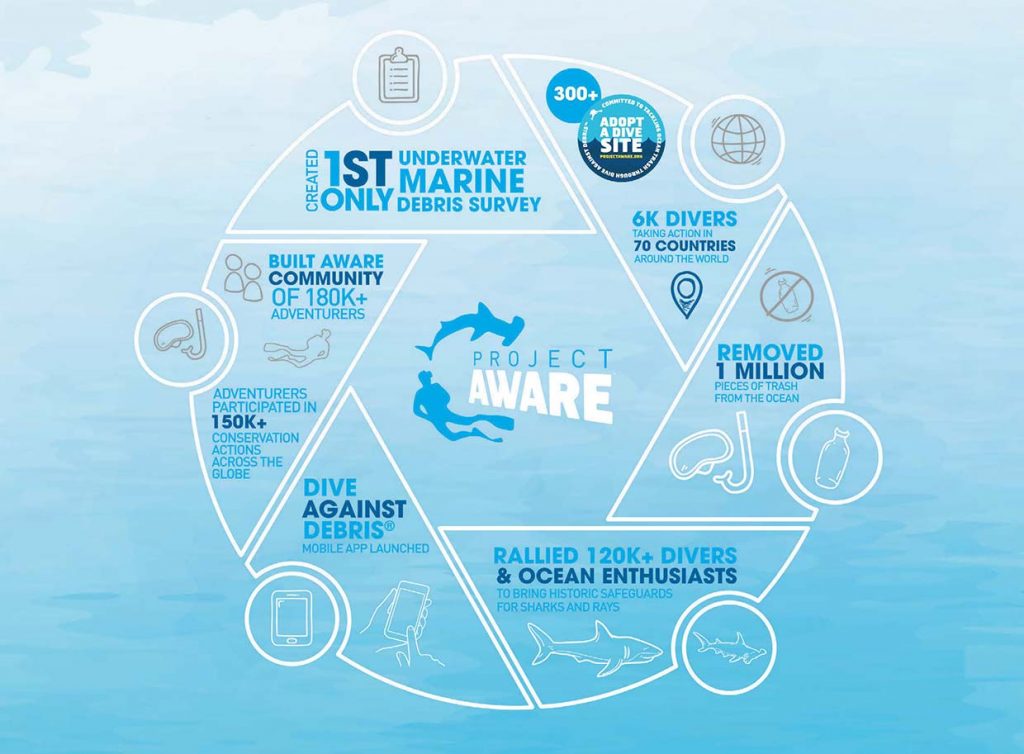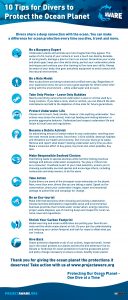
Project AWARE takes action to create both local and global change for the ocean and the communities that depend on it. For over 25 years, together with our partners and global community, we responded to the threats our ocean faces and we’ve had some incredible successes:
 TAKING ACTION AGAINST Marine Debris
TAKING ACTION AGAINST Marine Debris
Project AWARE works to reduce the underwater impacts of marine debris and prevent trash from entering the ocean in the first place.
Marine debris is not only unsightly, but it’s also dangerous to sea life, hazardous to human health, and costly to our economies. Marine animals become entangled in debris, and even mistake it for food – often with fatal results. Divers, swimmers, and beachgoers can be directly harmed by encounters with marine debris or its toxins. The environmental damage caused by plastic debris alone is estimated at US$13 billion a year.
An ideal thought is to follow the next 10 tips:
1. Be a Buoyancy Expert
Underwater plants and animals are more fragile than they appear. The
swipe of a fin, a bump of your camera or even a touch can destroy decades
of coral growth, damage a plant or harm an animal. Streamline your scuba
and photo gear, keep your dive skills sharp, perfect your underwater photo
techniques and continue your dive training to fine-tune your skills. Always
be aware of your body, dive gear and photo equipment to avoid contact with
the natural environment.
2. Be a Role Model
New scuba divers are being trained and certified every day. Regardless of
your experience level, be sure to set a good example for others when interacting
with the environment – while underwater and on land.
3. Take Only Photos – Leave Only Bubbles
Nearly everything natural found underwater is alive or will be used by a
living creature. If you take a coral, shell or animal, you can disturb the delicate
balance and add to the depletion of dive sites for future generations.
4. Protect Underwater Life
Choose not to touch, feed, handle, chase or ride anything underwater. Your
actions may stress the animal, interrupt feeding and mating behavior or
provoke aggressive behavior. Understand and respect underwater life and
follow all local laws and regulations.
5. Become a Debris Activist
An astonishing amount of waste makes it’s way underwater, reaching even
the most remote ocean areas. Once there, it kills wildlife, destroys habitats
and threatens our health and economy. Don’t let your dives go to waste.
Remove and report what doesn’t belong underwater every time you dive.
Make a conscious effort to buy green, buy local and, when possible, buy
less.
6. Make Responsible Seafood Choices
Overfishing leads to species declines while harmful fishing practices
damage and pollute underwater ecosystems. You play a critical role
as a consumer. If seafood is part of your meal selection, ensure you’re
choosing sustainably sourced species and encourage others, including
restaurants and shop owners, to do the same.
7. Take Action
Scuba divers are some of the strongest ocean advocates on the planet.
Now, more than ever, divers like you are taking a stand. Speak out for
conservation, share your underwater images, report environmental
damage to authorities and campaign for change.
8. Be an Eco-tourist
Make informed decisions when choosing and visiting a destination.
Choose facilities dedicated to responsible social and environmental
business practices that include water conservation, energy reduction,
proper waste disposal, use of mooring buoys and respect for local cultures,
laws and regulations.
9. Shrink Your Carbon Footprint
Global warming and ocean acidification are putting your favorite animals
and the whole ocean planet at risk. Do your part by understanding
and reducing your carbon footprint and look for ways to offset what you
can’t reduce.
10. Give Back
Ocean protection depends on all of our actions, large and small. Investing
in the ocean protects our planet and lets the dive adventure live on.
Donate or fundraise for ocean protection to fuel the grassroots action
and policy change necessary to ensure a clean, healthy ocean planet.

One Reply to “Dive Against Debris”
Comments are closed.